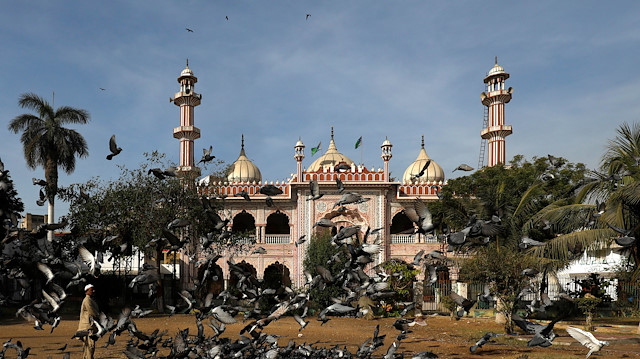
Example of inter-religious harmony, Hindu trader takes care of mosque, expenses to help Muslims to offer prayers
Visitors do not find any architectural attraction towards a mosque situated on Karachi’s busiest Faisal Street, but the difference in this mosque -- in the heart of Pakistan’s commercial capital -- is that its custodian is a Hindu.
A Hindu custodian of a mosque in a Muslim majority country may sound far-fetched. But Pahlaj Rae, a local businessman has been taking care of this mosque over many years.
On a typical Friday, he reaches the mosque, much before worshipers arrive to supervise arrangements. He rolls plastic sheets on the stony floor outside the mosque, to temporarily add to the capacity to house faithful to offer prayers.
“We began this [arrangement] nearly three years ago. There was no mosque in the vicinity, where my employees and others working in nearby offices could go and offer prayers,” Rae told Anadolu Agency.
When the number of worshipers swelled, he hired a permanent imam (prayer leader), and a muazzin (one who calls for prayer five times a day).
He also shuts down his gas station located nearby for two hours to provide space for the Friday prayers.
“I have done nothing special. I am not doing this for publicity or advertisement. It was my duty to take care of the spiritual and religious requirements of my employees, and neighbors,” said Rae.
Fearing that publicity will wash away his benevolence and invoke religious sensitivities, he refused to be get photographed.
Rae said shutting down business for a couple of hours on Friday has never bothered him.
“It does not occur to me that there is any financial loss by keeping the gas station shut for two hours. And even if it does, I do not care. The feeling that you have done something good for your brothers and friends is more precious," he said.
- Religious harmony
Akhtar Shaikh, Muslim business partner of Rae, said that taking care of a mosque by a Hindu reflected the excellent religious harmony between the majority and the minority communities in the city.
“It was my idea to make permanent arrangements for Friday and daily prayers, but later, he [Rae] took it to himself and did everything”, Shaikh told Anadolu Agency.
“Now, he [Rae] is managing everything, from utility bills to salaries [of imam and muazzin], and other expenses”, he added.
Rae said religious harmony in the city has turned better since he saw mobs attacking Hindu temples, following the demolition of the 16th-century Babri Mosque, in neighboring India in 1992.
Rae himself had taken shelter in the house of his Muslim neighbors when a charged mob, calling for revenge, was marching towards the country’s famous Shri Swami Narayan temple in 1992.
In Pakistan some 30 temples were attacked, 25 of them across the southern province of Sindh, home to 85% of the Hindus in Pakistan. Since then all these temples have been either rebuilt or repaired.
In India, then Prime Minister P. V. Narasimha Rao had also pledged to rebuild the Babri Mosque, in a televised address to the nation.
However, the Indian Supreme Court last November handed the site of the historic mosque to Hindus for the construction of a temple following a prolonged legal battle.
“There is no comparison between the situations in 1992 and Nov. 2019. I had to leave my home and take shelter to save me and my family, but in Nov. 2019, I stayed at my home without any fear,” added Rae.
Hindus, the largest minority in Pakistan, make up 4% of the country’s more than 200 million population.
Pakistan is home to several sites revered by Hindus. The Katas Raj temple in the northeastern Chakwal district and Sadhu Bela temple in southern Sukkur district are the two most visited rites by Hindus across the world.
According to local media, the government plans to reclaim and restore 400 temples, which have been illegally occupied by land grabbers, to Hindus across the country.


